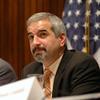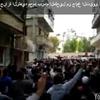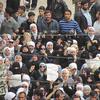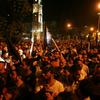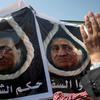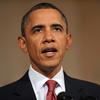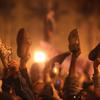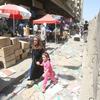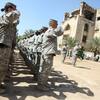Anthony Shadid appears in the following:
Anthony Shadid
Friday, December 28, 2012
New York Times reporter Anthony Shadid died on February 16, at the age of 43, while on assignment covering the conflict in Syria. He was a guest on the Leonard Lopate Show many times, discussing in depth the politics and turmoil in across the Middle East. He was awarded the Pulitzer Prize for his reporting, and to remember him we’re re-airing an interview with him from September 2005, about his book Night Draws Near: Iraq's People in the Shadow of America's War, about his time reporting on the U.S.-led invasion of Iraq.
Listen to all of Anthony Shadid's interviews on the Leonard Lopate Show here.
Tribute: Anthony Shadid
Friday, February 17, 2012
New York Times reporter Anthony Shadid died on February 16, at the age of 43, while on assignment in Syria. He had been covering conflict in the Middle East for almost 20 years, reporting for The New York Times, The Washington Post, The Boston Globe, and The Associated Press. He was awarded two Pulitzer Prizes for international reporting, in 2004 and in 2010, for his coverage of Iraq for The Washington Post. Mr. Shadid was a guest on the Leonard Lopate Show many times, discussing in depth the politics and turmoil in across the Middle East. Leonard spoke to him most recently in April 2011 about covering the events in Libya and his own capture there, and about anti-government protests in Syria. You can listen to those interviews and others he's had with Leonard over the years:
Government Continues to Crack Down on Protesters in Syria
Monday, August 15, 2011
Syria continued its violent crackdown on protesters this week and increased its escalation using navy vessels to go after the port city of Latakia on Sunday. At least 25 people are reportedly killed including three children, according to our partner The New York Times. Joining us is Anthony Shadid, Beirut bureau chief for The New York Times, whose been covering this story.
US Calls For President Assad to Step Down Amid Unrest in Syria
Thursday, August 11, 2011
As unrest spreads in Syria the government continues to crack down on demonstrators. But President Bashar al-Assad's government seems to be weakening and losing nearly all of its international support. The United States has imposed sanctions on Syria's largest bank and mobile phone operator while calling on Assad to step down from power. Meanwhile within Syria, even members of the political and social elite are starting to back away from the Assad regime.
Violence Continues in Syria
Monday, August 08, 2011
There are reports of fresh artillery fire early this morning in the eastern city of Deir al-Zour, Syria, following a bloody weekend that killed dozens and forced thousands to flee as the Syrian regime continues its violent crackdown on protesters. In response to the violence, Saudi Arabia joined the chorus of international condemnations, removing their ambassador from Syria. King Abdullah of Saudi Arabia has called for an end to the bloodshed. The crackdown by Syrian President Bashar al-Assad has left more than 2,000 people killed by the count of some human rights groups.
Arab World Watches as Mubarak Stands Trial
Wednesday, August 03, 2011
Crowds gathered this morning outside the police academy in Cairo where former Egyptian President Hosni Mubarak appeared before a court to face charges of corruption and ordering the killing of protestors during the revolts that took place earlier this year. Mubarak, who had not been seen in public since he was deposed in February, pleaded not guilty. The trial carries a great deal of significance in the Arab world, as Mubarak is the first modern Arab ruler to be tried in public by his own people following a revolution, and could face the death penalty if convicted.
US Ambassador Visits Flashpoint City in Syrian Uprising
Friday, July 08, 2011
U.S. Ambassador to Syria Robert Ford made an unannounced visit to the city of Hama yesterday. Ford apparently traveled to Hama on his own to show solidarity with the four month uprising against Syrian President Bashar al-Assad. Anthony Shadid of The New York Times reports on Ford's trip from Beirut, Lebanon.
Syrian President Assad Calls Protesters 'Saboteurs'
Monday, June 20, 2011
In a live national address this morning, Syrian president Bashar Assad accused "saboteurs" of trying to smear the world's image of the country, by protesting his rule for the past three months. Assad also made an appeal to the thousands of Syrians who have fled to the border of Syria and Turkey to return to their homes, saying that the biggest danger facing the country is the threat of an economic collapse. Anthony Shadid reports from Beirut for our partner, The New York Times. He speaks with us about President Assad's speech, and whether or not it will change the course of events in Syria.
The Latest on Syria
Thursday, May 12, 2011
Anthony Shadid, New York Times correspondent in Beirut, and Joshua Landis, director of the Center for Middle East Studies, associate professor at the University of Oklahoma and writer of the Syria Comment newsletter, discuss the latest on the uprising and crackdown in Syria.
→ Add Your Comment, Listen and Read a Recap at It's A Free Country
Harsh Crackdowns Continue to Escalate in Syria
Thursday, May 12, 2011
The crackdown on pro-democracy activists in Syria has worsened. Plain clothes police have been pulling protesters off the streets and throwing them into vans, and threatening imprisonment to those who have video of protests on their cell phones. We get an update on the situation in that country from Anthony Shadid, reporter for The New York Times. Shadid explains that Syria's government is "in survival mode and it has signaled it's intention in brute force." Is it time for international intervention?
Syria: Crackdown Intensifies, Government Claims Upper Hand
Tuesday, May 10, 2011
The Syrian government says it has control over the seven-week uprising in the country where many protesters have been wounded, arrested or killed. Human rights groups say at least 580 people have been killed since March. A Syrian official told the press that President Bashar al-Assad's crackdown was necessary to squelch, what she called, an armed uprising. Correspondent for The New York Times, Anthony Shadid says that the government is positioning the struggle as necessary to protect the Alawites, the minority ruling group. The alternative, according to the government, is chaos.
Activists Say at Least 6 Killed in Syria as Protests Continue
Friday, May 06, 2011
Dozens of towns and cities in Syria are seeing protests today, with witnesses saying that at least six people have been killed. In past weeks, thousands have turned out to demand new leadership in Syria despite an increased and violent government crackdown. "There are competing narratives," says Anthony Shadid, reporter for The New York Times, "there's a real struggle of wills on who has the upper hand."
Update on the Protests in the Arab World: Syria
Friday, April 29, 2011
As part of our ongoing series about the protests throughout the Arab World, New York Times Beirut bureau chief Anthony Shadid gives us an update on Syria, where the government has violently cracked down on protesters throughout the country and has kicked foreign journalists out of the country.
Verifying the Videos of an Uprising
Wednesday, April 27, 2011
For several weeks we’ve watched as videos have trickled out of Syria onto YouTube and other websites. The Syrian activists who take the video say they are images of protests that turned violent at the hands of the Syrian government.
Anthony Shadid on Covering Libya
Wednesday, April 06, 2011
Anthony Shadid, Beirut bureau chief for The New York Times, talks about covering the unrest in Libya and being captured by the Libyan government and held for six days, along with his colleagues Lynsey Addario, Stephen Farrell and Tyler Hicks.
What's Next for US-Egypt Relations?
Thursday, February 03, 2011
Correspondent for The New York Times, Anthony Shadid writes that the future of the Arab world "was fought for in the streets of downtown Cairo on Wednesday." The populace is rethinking its role in Egypt as it calls for a new government. However, a new government will also mean a new understanding of U.S.-Egypt relations.
Mideast Models for Egypt's Nascent Democracy
Wednesday, February 02, 2011
The popular uprising in Egypt is unprecedented as citizens forced an end to President Hosni Mubarak’s 30 year regime. The transition to a democratic government will be fraught with challenges, but such a transition is not unprecedented in the region. What does democracy look like in the Middle East?
Could Popular Uprising in Tunisia Spread to Other Arab States?
Monday, January 17, 2011
Tunisia's army clashed with armed gangs in Tunisia's capital on Sunday, two days after a popular uprising forced long-time dictator, President Zine El Abidine Ben Ali, to flee the country. Popular support for Tunisians’ freedom is echoing across the Arab world. Anthony Shadid, a foreign correspondent for The New York Times, has reported from most countries in the Middle East over his fifteen year career. He says that the Arab world is facing its most dangerous and yawning divide between ruler and ruled.
'New Dawn' for Iraq?
Monday, September 06, 2010
Less than a week after President Obama declared the end of combat operations in Iraq, U.S. forces have exchanged fire with insurgents in Baghdad. American troops helped repel a coordinated attack on an Iraqi base. At least five bombers carrying grenades and wearing suicide jackets attempted to breach checkpoints and killed at least 12 people, wounding at least 20.
The engagement was the first for U.S. forces since last Tuesday, when President Obama delaclared the end of Operation Iraqi Freedom, the 7 1/2 year war, and the start of Operation New Dawn, in which 50,000 troops will remain in Iraq in a non-combat role to support and train the Iraqi military.
The Future and Legacy of the Green Zone
Wednesday, August 11, 2010
The Green Zone was established in Baghdad when U.S. troops invaded in 2003, and since then it has come to symbolize much of the American presence, both in Iraq and abroad. It is a fortress, a city within a city, and the headquarters of both American power and the Iraqi government.
Today we take a look at the Green Zone’s future and legacy as American troops continue their withdrawal from Iraq, and whether the Green Zone needs to be dismantled in order for the country to have true sovereignty.
